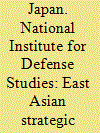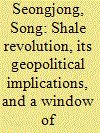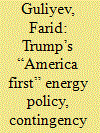|
|
|
Sort Order |
|
|
|
Items / Page
|
|
|
|
|
|
|
| Srl | Item |
| 1 |
ID:
144965


|
|
|
|
|
| Summary/Abstract |
WASHINGTON'S FOREIGN POLICY has played and continues to play one of the main roles in the international political and military crises in Ukraine, in the way they began and are unfolding. The American ruling circles spent twenty-five post-Soviet years tightening their grip on Ukraine and its people through a network of institutions ranging from the oligarchs with money in Western banks and numerous NGOs to rigidly controlled political parties and neo-fascist fighters - thrown into action at the opportune moment to bring a pro-American regime to power.
|
|
|
|
|
|
|
|
|
|
|
|
|
|
|
|
| 2 |
ID:
127930


|
|
|
|
|
| Publication |
2014.
|
| Summary/Abstract |
Only five years ago, the world's supply of oil appeared to be peaking, and as conventional gas production declined in the United States, it seemed that the country would become dependent on costly natural gas imports. But in the years since, those predictions have proved spectacularly wrong. Global energy production has begun to shift away from traditional suppliers in Eurasia and the Middle East, as producers tap unconventional gas and oil resources around the world, from the waters of Australia, Brazil, Africa, and the Mediterranean to the oil sands of Alberta. The greatest revolution, however, has taken place in the United States, where producers have taken advantage of two newly viable technologies to unlock resources once deemed commercially infeasible: horizontal drilling, which allows wells to penetrate bands of shale deep underground, and hydraulic fracturing, or fracking, which uses the injection of high-pressure fluid to release gas and oil from rock formations.
|
|
|
|
|
|
|
|
|
|
|
|
|
|
|
|
| 3 |
ID:
131288


|
|
|
|
|
| Publication |
Tokyo, Japan Times, 2014.
|
| Description |
xv, 359p.Pbk
|
| Standard Number |
9784789015615
|
|
|
|
|
|
|
|
|
|
|
|
Copies: C:1/I:0,R:0,Q:0
Circulation
| Accession# | Call# | Current Location | Status | Policy | Location |
| 057791 | 355.0095/JAP 057791 | Main | On Shelf | General | |
|
|
|
|
| 4 |
ID:
149863


|
|
|
|
|
| Summary/Abstract |
While the shale revolution was largely a US’ affair, it affects the global energy system. In this paper, we look at the effects of this spectacular increase in natural gas, and oil, extraction capacity can have on the mix of primary energy sources, on energy prices, and through that on internal political stability of rentier states. We use two exploratory simulation models to investigate the consequences of the combination of both complexity and uncertainty in relation to the global energy system and state stability. Our simulations show that shale developments could be seen as part of a long term hog-cycle, with a short term drop in oil prices if unconventional supply substitutes demand for oil. These lower oil prices may lead to instability in rentier states neighbouring the EU, especially when dependence on oil and gas income is high, youth bulges are present, or buffers like sovereign wealth funds are too limited to bridge the negative economic effects of temporary low oil prices.
|
|
|
|
|
|
|
|
|
|
|
|
|
|
|
|
| 5 |
ID:
132714


|
|
|
|
|
| Publication |
2014.
|
| Summary/Abstract |
All ideological reflections on energy made by American political scientists reveal the same key approaches as in the overall policy - the same double standards and the obvious desire to create controlled chaos. One can endlessly redraw the global energy map and rearrange key players on it while firmly believing in the enormous potential of unconventional hydrocarbons, as our American counterparts do, but a sincere belief alone would not be enough to bring about serious changes into the world energy market. However, it would be more than enough to convince the audience whose hopes for new and - most importantly - cheap energy resources render it incapable of making a sober assessment of reality. We have been witnesses to this information thrust from overseas over the past five years, as it is vividly evidenced by an article America's Energy Edge: The Geopolitical Consequences of the Shale Revolution by two American authors Robert D. Blackwill and Meghan L. O'Sullivan. The ideologists of a shale oil and gas revolution remain true to themselves - the audience needs to be constantly reminded that the global energy sector is no longer what it used to be five years ago and that its main actor now is the United States.
|
|
|
|
|
|
|
|
|
|
|
|
|
|
|
|
| 6 |
ID:
137220


|
|
|
|
|
| Summary/Abstract |
The shale oil and gas production boom has played a significant role in bringing about the recent precipitous fall in oil and gas prices, and in catapulting the United States into first place for oil production last year, ahead of Saudi Arabia. A number of factors at the core of the boom in the United States have contributed to its success: the combination of technological breakthroughs (e.g., horizontal drilling and hydraulic fracturing); talented entrepreneurship; a business-friendly financial
market; technological R/D initiatives supported by the government; favorable geological conditions; and the property-rights regime. The EU and Asia also stand to gain from the shale windfall; Russia, Saudi Arabia, Iran, and other OPEC members, on the other hand, are facing seriously negative impacts. Northeast Asia—particularly the Republic of Korea (ROK), China, and Japan—may have an
opportunity to benefit from the “Shale Revolution,” with the potential emergence of natural gas trading hubs in the region. This paper seeks to (1) identify the current status of the Shale Revolution, including the factors responsible for its success and the role of entrepreneurship in the shale breakthrough; (2) examine the geopolitical implications of the shale boom on important global players; and (3) explore the window of opportunity that is now open to nations in the Northeast
Asia region related to the Shale Revolution.
|
|
|
|
|
|
|
|
|
|
|
|
|
|
|
|
| 7 |
ID:
176756


|
|
|
|
|
| Summary/Abstract |
The global energy system is in transition to a new energy order characterized by the emergence of the United States as a net oil exporter, the shale revolution and the gradual shift towards low-carbon sources and renewables. The shale boom in the US was a game changer, as was the election of Donald Trump as US president. Trump pushed an ambitious “America first” agenda aimed at transforming the US into a global energy superpower. The purpose of this article is two-fold: first, it outlines the key pillars of the emerging global energy order. Second, it underscores the role of contingent events, a factor neglected by some previous studies because of their reliance on what A.O.Hirschman (1970) termed “paradigmatic thinking”. The recent transition in the international energy order is an outcome of two paramount, yet largely unanticipated events: the shale revolution in the US and Trump’s neomercantilist and unilateralist economic policies. While contingencies are an inherent feature of social reality, the scenario approach can be a useful heuristic for dealing with uncertainties. The article concludes by discussing the implications of these developments for global energy governance.
|
|
|
|
|
|
|
|
|
|
|
|
|
|
|
|
| 8 |
ID:
137816


|
|
|
|
|
| Summary/Abstract |
Increased shale gas and shale oil production in the USA will affect global geopolitics and national security considerations. An influx of Qatari LNG into Europe and Asia, which is diverted from the USA, erodes the tremendous market share held by the Russian gas company Gazprom and significantly reduces its pricing power. The USA did not begin to import the quantities of LNG from countries like Qatar and Trinidad and Tobago. Those quantities have instead been redirected to other markets, including Europe. As part of the impact of the US shale revolution, Russian energy control over Europe will be greatly reduced. Russia’s power over the region will also be reduced. Russia has earned from US$42 billion to US$60 billion per year from selling gas to Europe. Fewer exports and lower prices will cut those revenues. Given the importance of oil and gas companies to Russia’s economics, it is urgent for Moscow to restrict Central Asian production and infrastructure to mainly or even exclusively Russian channels lest Russian oil and gas become less competitive due to its own high cost and wasteful monopolistic structure and dilapidated infrastructure.
|
|
|
|
|
|
|
|
|
|
|
|
|
|
|
|
|
|
|
|
|